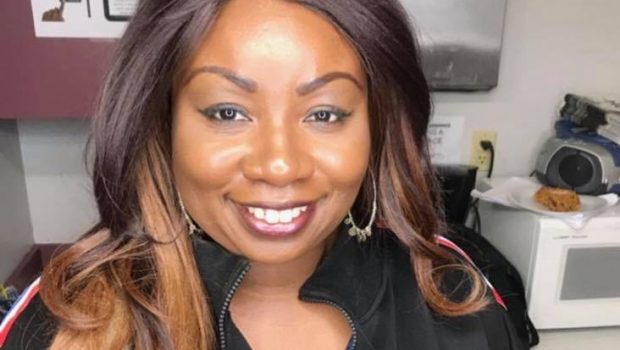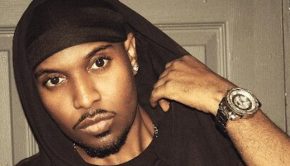Meet Tasha Poullard / #WE Exec. VP
Tasha Poullard is a force of nature, an extremely strong woman. Strong opinions, strong beliefs, strong values, strong persona.Tasha Poullard is not a woman one wisely underestimates.
She is a DJ, a former government hacker, former veteran with the U.S. Navy, former D.O.D contractor, a playwright, a writer, an IPOD broadcaster, an actress and now has become the Exec. V.P of #WE, the women empowerment network.
She is being added as the Senior Commentator on the all new #WE News as their resident ” Yoda”, because she is extremely informed, extremely experienced and a walking textbook of facts, figures and protocols. She is Yoda on steroids when it comes to women’s issues. #WE news is the all women news cast with news about women, by women, for women.
Tasha is also an entertainment DJ , with the stage name DJ Noyota. She hails from Houston, Texas.
She is the aggressive ” can-do, go-to” Exec. VP for the #WE movement, the nation’s largest women empowerment campaign. Tasha Poullard is in charge of sponsorship and sponsorship offers and has her hand in the promotion and expansion of both the #WE movement and Women Empowerment Movement. She is 3rd in command at the #WE movement and women empowerment movement.
You were a Government hacker for the military?
Well, yes and no (laughing) I was a Computer Systems Security Analyst Level III for Department of Defense for about – roughly – 6 years. Were my main duties included: Intrusion Detection, Network Configurations Management, TCP/IP Networking, and Customized Intrusion Event Reporting. With some level of Ethical Hacking. Basically it was a hyper from of Network Assessment. But I was gainfully employed with U.S. Air force Combat Information Transport System (CITS) 33rd Information Operations Squadron, and the Army Cyber Operations and Integration Center (ACOIC) Attack Sensing and Warning (AS&W) Team.
I didn’t know the Government had hackers which they pay to hack other people? Please elaborate.
The government has a variety of cyber security services and occupations that range from secure communications, specialized coding for what’s called “penetration testing” – where a group of trained IT professionals assess the effectiveness of security controls by simulating world attacks on D.O.D and civilian networks – mimicking the most current computer exploits that may pose a threat to our information systems infrastructure. It just allows us the ability to show both military and civilian leadership where there’s ‘gaps’ in our network security that requires immediate resolve.
All in all, I don’t want people to think that it’s a group of hackers off the street sitting in a basement launching cyber exploits against the American government for fun. It doesn’t work like that (laughing). It takes years of training, to include the legalities of being able to access these sensitive networks (you must be thoroughly vetted by the U.S. Government) and there’s various stages of background checks that you must undergo and pass before even being able to carry out these duties.
How did you get that job and what was your background for that? What were your specific duties?
I learned out Information Systems Security while active duty in the United States Navy. I was what’s called a Cryptologic Technicians Operator – or I think they were called Cryptologic Technicians Communications at one point – which was the acronym CTO for short. Last I heard they were CTN’s for Cryptologic Technicians Network (Specialist perhaps.
My specific duties as a CTO included providing telecommunications support to the fleet (air, surface, and shore), information processing using various computer terminals, controlling and operating communications systems and networks (that included satellite communications systems, network servers, patch panels, modems, routers, multiplexers and communications security devices). As well as assuring signal quality and path integrity. This was carried out while serving onboard the USS FLETECHER DD992 – based out of Pearl Harbor, HI. But I’ve held other duties and responsibilities in Information Systems Security as a Digital Analyst, Network Configurations Manager and Network Intrusion Detection Specialist.
The majority of my career in the Navy – as well as while working as a civilian contractor – was geared towards Information Systems/Cyber Security and the ethics of assessing Department of Defense networks.
You are a military Veteran. What are some issues that women in the military face?
Many women I know personally, some of whom I’ve served with or I’ve met in passing – speak candid amongst themselves about the social-psychological issues of military sexual trauma or MST. Thankfully I’ve never experienced it. But have been a victim of severe levels of sexual harassment.
While stationed at Ft. George G. Meade in Hanover Maryland, I received training to be what’s called a Sexual Assault Victims Advocate or “S.A.V.I.” advocate. My job while standing duty in that capacity was to assist victims who report experiencing a sexual assault. I would have a ‘duty bag’ (or a duffle bag) that included all the proper tools (i.e. latex gloves, a change of clothes/socks, a first aid kit, if needed for example) that would assist me with becoming the first line of defense for any woman or man that reported an incident of rape/sexual assault. I even had to carry a duty phone (we had our own direct number) because the incidents being reported was very often.
I thought it was just an extra duty that I could add to my annual evaluation for advancement recommendations – because at that time I was naive to how import this job really was. But it wasn’t until I had undergone training for the position that it literally opened my eyes to how prevalent and real the issues of military sexual trauma (MST) was back then – and still is.
American service members – mainly women – who suffer from PTSD are as a result of having experienced sexual assault (some from multiple aggressors) while either on deployment or in a non-combative capacity. As one of my Army “Battle Buddies” put it to me – one of the scariest things to deal with is the idea that you have to keep your head down from fear of enemy fire, but you have to watch your six from a fellow service member who may be in the trenches with you.
Even if you’ve never been physically (raped) as a female service member – you’ve been threatened with rape, you have to deal with un-welcomed sexual advances and sexual harassment at varying levels…… where you can experience everything from having someone suggest you perform a sexual act on them in exchange for a service (I’ve lived through that myself), being slapped on the ass (I’ve had that happen several times), or being told what you can “suck” when you don’t say or do what makes a male counterpart comfortable with your presence (I’ve had to address that as well).
Now, this is a very hurtful and ugly story, but I’m no longer afraid to share it when making my point. I can recall a time that I was having a conversation with a group of friends prior to leaving work for the day. One sailor asked me what I had planned for the weekend? Not thinking much of the question, I responded and said I was going to hang out around the house and chill. Another sailor interjects and asked me “Well, do you have a dog?” I responded yes, again not thinking much of the question. Yes, I had a dog. He goes on to ask me “do you have a camera?” puzzled – I responded yes because I was just starting to break into photography. From there this “shipmate” had the nerve to suggest that I engage in a sexual act with my pet and film myself in the process for fun. Yes, that face you’re making now, that was mine as well. Everyone laughed – the women were uncomfortable (yet they laughed as well) and the men were cracking up. One man had tears in his eyes he was laughing so hard. I felt completely humiliated and embarrassed simultaneously. I wasn’t expected that at all.
I have had men do everything from ask for sex in exchange for completing paperwork in respects to military enlistment….to some wanting me to give them a hug and kiss for a job well done. I’ve had men flat out tell me that “b!@c#’s don’t belong in their military”.
The misogyny of dealing with these age-old gender discriminatory attitudes towards women in service have never left (and never will)…..because it’s still men pretty much running the show, thus, the reason there’s a high level of insensitivity towards women who experience sexual trauma while serving. Some of these men see women as nothing more than a sexual release or conquest – because they’re able to emotionally detach us from our humanity and personhood. We are not service members to some of these men. Some of them don’t see us as their equals. So we’re often disrespected, over looked for promotion and discriminated against.
And when a women are in range (in combative theaters of operation) with a group of men whose behaviors are unchecked/lacking discipline, women suffer. I can’t count the number of women who’ve told me their stories of rape/sexual assault while in combative areas of operation! As if there’s not enough to worry about. Some of them survived such attacks while in basic training.
Some of these men do not care!
I have friends now who’re dealing with the psychological aftermath of being raped, reporting the incident to their chain of command, even having the case tried before a military jury – and still seeing no justice.
Same day, different song.
What are the challenges and issues that are different in the military than in civilian employment?
For me personally it was career advancement. Honestly, at the time I was active duty I was not one of the best sailors. Some of my friend’s nick-named me “shipwreck” because I was always getting in trouble or something (laugh). I stayed in trouble! Was always cussing someone out. So I understand my downfall.
But I think what the military really needs to invest in – is psychological counseling (to include interpersonal communications training) and incorporating more of a culture of inclusion for people from varying backgrounds, of both genders, all orientations and various faiths / religious beliefs. They’ve made some strides to carry this out, but as the saying goes “even though we’ve come a long way, we still have a long way to go”. Because I still communicate with some of my friends currently in active duty, as well as those who’ve recently separated – and it’s the same issues of covert exclusion and decimation. Women are still experiencing sexual trauma. There’s still racial discrimination at all levels of rank. There’s still not enough diversity in leadership. The politics of military service are no different from civilian politics that (ruin) run our democratic election systems as civilians.
You are a #WE Vice President in women empowerment. What drew you to #WE?
After speaking with Mr. Lowell Beasley over the phone I was hooked. Joining any movement that will give women a platform to speak their truth and promote a positive image of women via mass media is always a bonus for me.
I am a content creator and #WE allows me the freedom to spread a message of peace, love and light to all women seeking positive affirmations and true stories of honor, courage and commitment to women’s advocacy.
What do you hope to accomplish in your post-military career?
I’m very close to completing state requirements to obtain my Bachelors in Visual Performing Arts (Theater Acting Concentration) – that I plan to use as a foundation to continue my Masters Studies in either Theater (Acting for the stage) or return to my first love of Film Production. I’m currently working with #WE leadership to write/produce/direct a series of short films that tackle such issues as
Human Trafficking (which is on the rise in the Black Community)
Women’s Advocacy from a global perspective. For example: combating child marriages, the modern day religious enslavement of women, the damages of war on women and girls, and female genital mutilation (FGM)
The systematic oppression of people throughout the African Diaspora (i.e. police brutality, mass incarceration, medical apartheid, the flawed child protective services (CPS)/foster care system, broken education and lack of mental health care assistance).
What is your mission statement?
I live by the saying “Faith is nothing more than one beggar, telling another beggar where to go and find the bread of life”. The more I learn about myself via my self-paced theological studies – that I combine with studies of metaphysics – I seek to provide teachings of peace, love and light to those seeking healing in the mind, body and spirit.
While presenting the truth of what we’re experiencing in the physical – and encouraging change in the spirit realm.
#WE News is bringing you in as a Senior Commentator, as a “Yoda” of wisdom. Tell me your Yoda wisdom on the women movement today; its challenges; the changes needed; and where it needs to go.
“Yoda” that still cracks me up when I hear that (laughing). I have a few thoughts to share – in regards to why I hesitate – and am very reluctant to attach myself to any movement at all.
First I want to say that I don’t give myself the title “feminist” because when you do that – people hate you simply based upon their preconceived notions (miseducation) of women’s suffrage and the actions of women who’re nothing more than self-professed feminists. Anyone can give themselves a title, but the fruits of their labor speaks to their true intentions.
I want you to hear me and my message! Do get my words lost in translation of the historical echoes of past female liberators. We may still be fighting some of the same radical fights, but my brand is specific to me. Because I’m coming from my place of purpose based upon my own experiences – and it’s not tied to what someone else has already introduced to the world and accomplished. People mistakenly believe that you must be a feminist to stand up for the rights and well-being of women. Some feminists believe this. I’m completely against that notion. You don’t have to wear a title to stand up for what’s right. Standing for the rights and well-being of our mothers, daughters, sisters, aunts, nieces, dear friends, fellow service members, female immigrants, the homeless, etc. – means you’re standing for the rights and well-being of another human being. PERIOD!
Standing for someone who has no voice and/or is a Black, Brown, Native, Asian, Immigrant, Gay/Straight/Bi, varying faith “body” means that you see their overall existence as a human being as being just as meaningful as the next. Thus,
Men can stand for women! And if most of them cared, they would.
I’m blessed to have men in my “man circle” of brothers who do care for women and stand shoulder to shoulder with me as a soldier in this fight for women’s equality. The idea isn’t to exclude men, it’s to get them to see that we NEED them to fight with us. They are the added “ingredient” – that if included into the mixture of change – would really assist us with birthing forward the change we’re seeking.
The real issue between women and men is a lack of humility. Something that both sides fail to include in dialogue for what constitutes justice and female empowerment. The same way we need men to check the privilege of the “good ol’ boy system” , we need women to hold women accountable for false allegations, manipulating the system to suit (white) privilege – which is a whole different can of worms, and to ensure that all women from every aspect of womanhood (a global perspective) is represented (not just cherry-picking a few that will be liberated).
We need to deal with racism amongst the female population. Addressing the social-psychological issues of colorism amongst women (i.e. the attitudes that one skin complexion is better than the other).
We need to deal with the negative attitudes that we have towards each other.
We need to completely eradicate any and all digital media that’s geared towards degrading/devaluing women of color ( i.e. reality T.V. programming, modern day female recording artists like Nikki Minaj and Cardi B).
We need to promote sisterhood over all. We can’t win the fight against gender inequality if we as women are divided ourselves. A house divided will fall.
What needs to be the focus of women empowerment in its current culture?
Speaking for women of color (even though this isn’t limited to our communities), if we want to deal with the issues we’re witnessing within our community, we need to deal with the brokenness within our girls…..that’s where the dysfunction in our community starts.
We don’t do enough to protect them. Honestly, we need to get real about human trafficking in the Black community. The Voice of Black Cincinnati Reports:
62% of human trafficking suspects are African American
52% of all juvenile prostitution arrests are African Americans
40 percent of victims of human trafficking are African-Americans
Human trafficking victims are typically poor and have a history of exploitation, substance or sexual abuse, learning disabilities and inadequate support systems. In 2012, the U.S. Department of Justice reported that 62% of human trafficking suspects, are African American males. Additionally, African American children (mostly female) make up 52% of all juvenile prostitution arrests.
These children are not prostitutes. They are victims.
I read a research report that the demand for African American trafficking victims is higher than the demand for other races……in which some are suggesting that this is because the accused traffickers who are caught tend to have more connections to African American victims and operate more comfortably in low-income African American communities where many victims live. When Black, Brown, Native/Indigenous, Asian and Immigrant girls are reported missing, they’re immediately listed as “runaways”. This “runaway” classification means that law enforcement is no longer obligated to expend money, man-power and resources to look for them, because the misguided belief is that they’ll find their way back home eventually. Thus, the reason the language for a missing child who’s blond hair with blue eyes and somewhat attract is different. They use words like “she’s believed to be in grave danger” and I heard one news broadcaster say “critically missing”. The language sets the tone for the severity of his /her case. …and this will determine who’s going to get involved in her relocation at the local, state even possibly federal level, to include what levels of punishment the trafficker will receive if caught trafficking the victim.
You see many of our children are messed up because their mothers have been ‘messed up’ as children. Female trafficking victims in our community (the black community) in most cases, don’t have access to therapy once they’re free. Many of them now have a criminal record because they’ve been arrested for prostitution – so they can’t get jobs – they’re convicted felons and they lack access to various forms of education, housing, etc….especially if they’ve had an issue with alcohol and substance abuse to numb the pain. Some have fallen victim to one or all of the three forms of trafficking
Pimp-Controlled Trafficking: An extremely dangerous – strategically targeting vulnerable youth with severe levels of manipulation and violence. Pimp’s groom and then control vulnerable youth by developing a connection or “special relationship” with their victim – such as a strong friendship, romantic/intimate partnership (fake love interest), or a family-like bond. Over time the relationship changes to one of power, control and abuse that results in domestic violence that ultimately leads the victim to willingly engage in sex work. Once the pimps groom the women with love, they convince them that they can make fast money by stripping or prostitution.
Gang Controlled Trafficking: Sex trafficking has become a lucrative enterprise for many street gangs and it rivals drug and arms trafficking in attractiveness. Drugs or guns can only be sold once, but a human being can be sold over and over. Gangs can sell their victims seven days a week and use marketing techniques to attract all sorts of buyers. Organized criminal networks are drawn to sex trafficking because they can make lots of money with an extremely low startup cost and risk of being caught by the authorities. There’s also a seemingly endless supply of “product”- young people vulnerable to their recruiting tactics, and “demand”- people, usually adults, desiring to pay lots of money for sex.
Family-Controlled Trafficking: Also referred to as “Intimate Partner and Familial Human Trafficking”…where a child is forced to engage in sexual acts in exchange for financial gain. This brand of abuse serves as the intersection between domestic violence and human trafficking, and is just as horrific as it sounds. Young people, boys and girls are forced into commercial sex by their relatives, i.e. parents, step- parents, aunts, uncles, grandparents, siblings, or cousins. There’s a plethora of cases reported where family members and intimate partners were perpetrators of forced commercial sex, domestic/sexual servitude and labor.
Women’s empowerment will only come (in my honest opinion) when we start getting “real” about human trafficking – especially in economically disenfranchised, impoverished and oppressed communities.
With regards to the #MeToo movement, can you tell me, in your opinion, how it has succeeded and in what ways it has failed?
How it has Succeeded:
In addressing the decades of rape and sexual assault (finally bringing the issue to light), after years of being swept under the rug by leadership in various branches of the entertainment industries and law enforcement, its holding men accountable for carrying out the acts of rape/sexual assault upon women seeking to further their career. The movement itself gave women a voice to stand up for themselves and be empowered to stand against the injustices in Hollywood. But that’s Hollywood. These are wealthy (in most cases white) women. What about the common woman? Most importantly what about the poor, immigrant, minority, LGBT youth who haven’t developed a voice themselves as of yet?
How it has Failed:
It’s not bringing forward enough convictions for starters. Weinstein was acquitted on all charges! But we got Cosby and we’re about to get Kelly. In most cases – we have been lead to believe that the physical evidence of an assault will speak for itself. Unfortunately, it doesn’t always lead to a guilty verdict – especially when the perpetrator is wealthy and white….and that’s if the charges ever make it to trial, as only 12% of rape cases make it to court and about 2% to maybe 8%, if I’m not mistaken, lead to a guilty verdict. Thus being charged or having accusations hurled at you ,doesn’t always mean you’ll be convicted and/or face jail time as a result.
It’s not addressing the issue of rape kits not being tested nationwide. If it is, we’re not hearing enough about it. It’s not providing training to law enforcement to proficiently process rape kits nor providing funding to have these kits tested immediately.
And not all cases are being heard!
It’s not doing enough to address rape culture that’s affecting the youth. Youth are often traumatized by these experiences and are made to believe they’re at fault by falling victim to predators in our community – in their homes. Society would have them believe that they got themselves into this situation. Many feel trapped and hopeless (as if there’s no way out) and they feel compelled to stay and suffer the consequences as a result – staying quiet about the abuse….especially when the abuser is well known and respected within the community – or a peer. The youth stuck in these unfortunate circumstances are unaware of the fact they’re a victim of a crime, because, again, we engage in this bout of slut shaming and victim blaming.
As we saw in the case of R. Kelly, many of these girls/boys won’t consider themselves a victim of said crime because the abuse has been normalized due to manipulative conditioning and past traumatic experiences. In order to incorporate a coping mechanism to deal with the abuse, they develop a form of Stockholm Syndrome that will lead them to develop feelings of sympathy for their abuser, even start to fall in love with them as a result.
The pimps will groom their victims to have both distrust and disdain towards any form of authority that would have the power to remove them from their situation – as a means of continued control.
The pimps will keep their victims secluded from family and friends, often shut off from the world and various forms of media – in some extreme cases victims of human trafficking are clueless of their whereabouts, because they’re constantly moved around. Some via shipping containers onboard ships or 18 wheelers, some in mass transportation in plain sight, others in high capacity trucks and vans with dark tented windows so that no one can see who’s inside them.
A study conducted by the McCain Institute identified 1,416 persons arrested for sex trafficking of a minor in the United States from 2010 to 2015. Below describes what each of their occupations were:
Juvenile Probation Officer
Youth Mentor
Truck Driver
Military Member
Prison Guard
Children’s Shelter Staff
Firefighter
Police Officer
Security Guard
Foster Parent
Counselor
Community and Religious Leaders (Church Leadership)
Taxi Drivers
#MeToo has a lot of work to do as it pertains to protecting our youth. Until they broaden their umbrella of protection to highlighting these individuals that operate in everyday life at all aspects of our daily dealings, I won’t be joining no time soon. I support their efforts from a distance because I understand the meaning and message. But like various feminist organizations, they need to take some diversity training.
Tweet





























